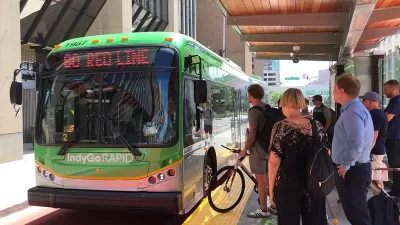Waiting for the funding to back up a transit plan can be brutal—especially when the calendar says February you thought you approved a transit-funding tax in the November election.

Voters and advocates in Indianapolis are learning that their vote to approve Question 2, a referendum to approve a transit-funding income tax, had a catch: it didn't actually approve a new law.
Despite earning 59.26 percent of the vote, writes Amber Stearns, "the ballot question in November was simply a way to gauge public support — to see if people would see a value in supporting mass transit in the form of a small income tax."
Now the task of passing the transit tax into law is up to the Indianapolis City Council, "and among the 25 city-county councilors there are a lot of mixed feelings about this proposal," reports Stearns.
At risk is a constant stream of revenue for IndyGo, and a transit plan that "includes a re-work of bus routes and frequency, a streamlined 7-day schedule for greater reliability and three rapid transit lines," writes Stearns. Planetizen Correspondent Irvin Dawid reported in detail on the unique structure of the income tax, and the political support that earned Question 2's approval, in an article from November.
The article by Stearns also offers an in-depth exploration of the politics at play as the tax heads to an expected vote in the City Council on February 27.
FULL STORY: City-County Council finds a difficult path to funding mass transit in Indy

Planetizen Federal Action Tracker
A weekly monitor of how Trump’s orders and actions are impacting planners and planning in America.

San Francisco's School District Spent $105M To Build Affordable Housing for Teachers — And That's Just the Beginning
SFUSD joins a growing list of school districts using their land holdings to address housing affordability challenges faced by their own employees.

The Tiny, Adorable $7,000 Car Turning Japan Onto EVs
The single seat Mibot charges from a regular plug as quickly as an iPad, and is about half the price of an average EV.

Seattle's Plan for Adopting Driverless Cars
Equity, safety, accessibility and affordability are front of mind as the city prepares for robotaxis and other autonomous vehicles.

As Trump Phases Out FEMA, Is It Time to Flee the Floodplains?
With less federal funding available for disaster relief efforts, the need to relocate at-risk communities is more urgent than ever.

With Protected Lanes, 460% More People Commute by Bike
For those needing more ammo, more data proving what we already knew is here.
Urban Design for Planners 1: Software Tools
This six-course series explores essential urban design concepts using open source software and equips planners with the tools they need to participate fully in the urban design process.
Planning for Universal Design
Learn the tools for implementing Universal Design in planning regulations.
Smith Gee Studio
City of Charlotte
City of Camden Redevelopment Agency
City of Astoria
Transportation Research & Education Center (TREC) at Portland State University
US High Speed Rail Association
City of Camden Redevelopment Agency
Municipality of Princeton (NJ)



























